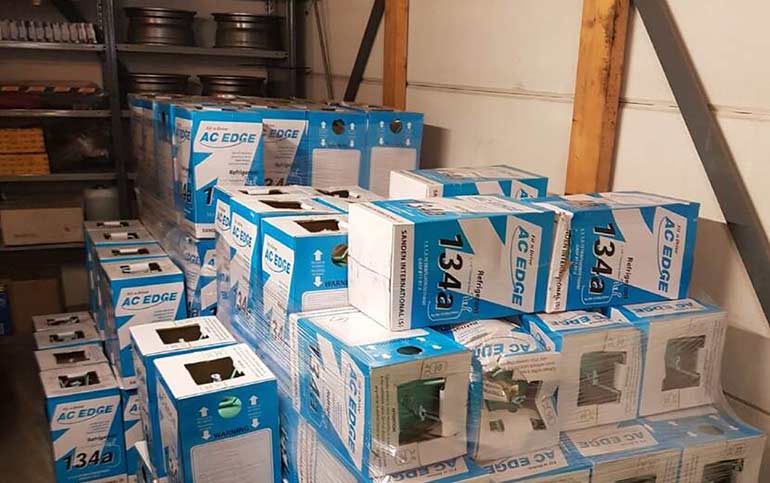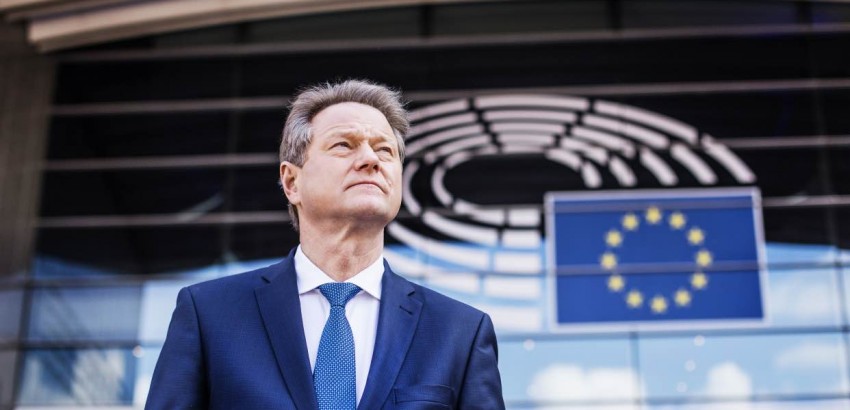Illegal refrigerant trade soldiers on
- PostedPublished 1 March 2019

Expert committee denounces lack of EC response to illegal, hazardous refrigerant import
A new committee established to tackle the challenges of fluorinated greenhouse gas (F-gas) regulations has slated the European Commission’s handling of illegal refrigerants.
The ‘Initiative Coolektiv’, which is led by experts from companies such as Honeywell, Chemours and Westfalen, states that refrigerants equivalent to 22.5 million tonnes of CO2 were illegally imported into the European Union in 2018 alone.
Among the refrigerants brought in were hydrofluorocarbons (HFCs) including R134a, R404A and R410A, all of which have high global warming potentials (GWPs). To put the severity and scale of the problem in perspective, the quantity of questionable refrigerants smuggled into the EU is equivalent to a staggering 18.75 per cent of the EU’s annual quota of some 115 million tonnes of CO2 equivalents.
Consequently, the Coolektiv is calling for support to stop the illegal trade of refrigerants – many of which are often contaminated or outright dangerous. In some cases, these refrigerants have led to explosions and deaths.
“To date, there have been far too few controls to prevent illegal imports of refrigerants into the European Union,” said Hans-Jürgen Kemler of the Westfalen Group. “Politically, smuggling damages the credibility of all institutions and companies involved in implementing the F-Gas Regulation.”
The vast majority of this illegal trade is motivated by the phase-down of high-GWP refrigerants in Europe, which is subsequently driving prices upwards. Most of these illegally offered refrigerants are in non-refillable containers, which were banned in 2007 – as, besides being wasteful, the containers often contained trace refrigerant which would eventually be released into the atmosphere. Despite the containers being illegal, they are often advertised in multiple places and easily acquired.
Operating alongside the Coolektiv is the ‘Bonn Voice’ coalition, which is formed from three of Germany’s refrigeration-associated companies – BIV, ZVKKW and VDKF.
The coalition is attempting to motivate those in the industry to report illegal activity which should help it get a better understanding of the overall underhand trade of refrigerants.
This, reportedly, will allow it to exert more pressure on official bodies in order to compel them to act against the surge in illegal and often dangerous refrigerants; in many cases, it says the refrigerant is often sourced from “foreign internet shops”.

In a release published on the illegal trade, ZVKKW and VDKF again echoed thoughts that the high price of F-gases was driving much of the activity – and that most of the refrigerant involved was of questionable quality and not being recorded on official quotas.
Similarly, Italian supplier General Gas has put out a notice that requests its customers inform it of any questionable refrigerant-related activities. It has also published advice on how to identify illegal refrigerants and deems that most are being sold by unlicensed companies and unofficial channels.
On its website, General Gas says: “We are verifying a massive presence on the national market of non-compliant containers and/or illegally imported product.
“The phenomenon is very worrying, as it generates serious risks both for the environment and for the safety of technicians and end users. Illegal sales seem to be particularly striking in the car air-conditioning sector (R134a).”
Miguel Cañete, commissioner for Climate Action and Energy in the European Commission, responded to this private action in parliament following a question from the group Europe of Freedom and Direct Democracy (EFDD). He said: “The Commission welcomes the action taken by private companies to take illegal market actors to Court as a complementary way of ensuring compliance by market actors.
Cañete added: “The Commission will continue to act in cases of infringement of the regulation, in particular with regard to illegal trade and sales, to ensure that the envisaged emission reductions can be achieved and that entities selling HFCs legally are facing fair competition.”
According to the UK specialist website Cooling Post, the European Commission otherwise states that it cannot confirm the true amounts of refrigerant being illegally traded – but that it is taking matter “extremely seriously”. Many discussions on the matter revolve around accurately ascertaining illegal imports and how to track legal imports; help will come in the form of a new EC system due online in 2020, which will register refrigerant quotas and imports.
Not long after the EC responded, however, Lithuanian MEP Rolandas Paksas attacked it for its comparative inactivity compared to the seemingly large-scale illegal import of refrigerants.
Paksas, in a parliamentary discussion, asked: “Why is the Commission not taking urgent interim measures to combat illegal imports of bulk HFC gases and equipment? Such inaction makes nonsense of the F-gas quotas and could cost millions of Euros in lost taxes.”

As Paksas suggests, there are indeed significant costs resulting from this illegal trade. The Polish environmental protection foundation, PROZON, has published a report that estimates some €6.96 million ($A11.13 million) in taxes and customs fees went uncollected in 2018 due to illegal smuggling.
PROZON notes, however, that increased activity by various official organisations should vastly reduce the scale of the illegal activity in 2019.
The scale of the illegal imports is, in many a case, remarkable. Only recently, again in a story published by Cooling Post, Bulgarian customs officers were reported to have intercepted a truck from Turkey containing 981 13.6kg cylinders of R22 – a whopping total 13,342kg of refrigerant and one that is also banned in Europe. Days later, the officers seized yet another truck from Turkey carrying a load of around 1000 cylinders of undocumented refrigerant.
There have also been significant confiscations of refrigerant in Papua New Guinea.
A story by daily newspaper The National reported that 36 15kg bottles of the ozone-depleting R22 were recovered from a shop in Port Moresby; subsequently, an investigation revealed that the supplier – the Pacific Coast Corporation – had imported around 1152 cylinders of R22 without the required permits.
Authorities are seeking the company directors and, furthermore, are attempting to phase out R22 in its entirety by 2025.
In more positive news, the UK organisation Register of Companies Competent to Manage Refrigerants (REFCOM) reports that steps have been taken to reduce the sale of illegal refrigerants, including removing disposable bottles of refrigerants from the market. The UK’s Department for Environment, Food and Rural Affairs (DEFRA) has also confirmed that the country’s Environment Agency is also taking on more staff to allow it to better deal with compliance issues and maintain a new reporting and quota system – which will be essential in a potential post-Brexit environment.
EU F-gas prices start to settle
A REPORT presented by Öko-Recherche, an independent research institute, has showcased how prices of HFCs are beginning to settle following two years of significant rises.
Julia Kleinschmidt, project manager for Öko-Recherche, presented the company’s findings at the European Partnership for Energy and the Environment (EPEE) roundtable in November 2018.
The data revealed that, although prices of R404A, R410A, R407C and R134a had risen dramatically in early 2018, many of their costs had started to fall in the second half of the year. Both R410A and R134a, for example, began to drop in price after substantial hikes earlier in the year.
Lower GWP refrigerants didn’t increase in value as much as the higher GWP refrigerants, such as R404A, while the report also showed that less costly natural refrigerants – such as propane – had dropped slightly in value over the course of 2018.
These variations in prices, according to the companies involved, are the result of several variables including stockpiling and illegal trade.
The research, which is an ongoing project commissioned by DG CLIMA – the EC department for climate action – is the result of a study that has been running since 2016.
Data has come from a total of 62 companies, including those involved in industrial and commercial refrigeration.
Öko-Recherche warns that prices may not continue to fall, though, despite the study’s results.
The report states: “Some companies expect ‘wave-like’ price trends for the future – i.e. price increases at the beginning, falling prices towards the end of the year.”
Fortunately, according to a report published by climate specialists Eurovent, the cost of some high-GWP refrigerants is causing businesses to investigate less harmful alternatives. This, in turn, is helping Europe meet its F-gas reduction targets despite illegal trading. DG CLIMA has acknowledged the illegal trade, however, and is working to improve awareness of the issue and boost customs crackdown on undocumented imports of refrigerants.
- CategoriesIn SightGlass
- TagsEurope, F-Gas, HFC phase down, HFC phasedown, Illegal refrigerant, illegal refrigerants, refrigerant, SightGlass News Issue 16

